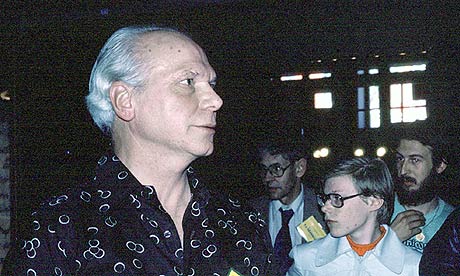
Philip José Farmer, who passed out of this world yesterday, was among the last of a generation who emerged from the revolutionary literature of science fiction. Along with contemporaries including Robert Heinlen, Isaac Asimov, Philip K Dick and Kurt Vonnegut, Farmer dedicated his life to writing stories that forced their readers to confront and question many of their most basic assumptions about life, the world, and that slippery beast called "reality".
Given the incredible social and political conformism of the times Farmer wrote in, it seems amazing that he and his fellow revolutionaries were given almost unfettered access to a generation of young minds. The America of the 1940s and 50s was a time and place consumed by cold war politics, and busying itself with the construction of the military-industrial-complex and consumer culture that would have such joyous outcomes for so many of us today. And yet from this climate of self-censorship emerged one of the most subversive, anarchic and often filthy literary movements of the 20th century. Perhaps because they were born in the pages of the pulps, and clothed as meaningless entertainment for the masses, science fiction stories were publicly available in every drugstore across the continent despite being crammed full of ideas that most self respecting Christian conservative Americans would have died before exposing their children to.
Farmer made an early name for himself with his story The Lovers, a rather unsettling tale of one man's romantic affair with a parasitic alien entity that has taken the form of a human female. The revolutionaries of science fiction, still probing the limits of what they could get away with, were so impressed by Farmer's full frontal confrontation of the great sex taboo that they gave him a Hugo and asked him to join the club. The decades that followed saw Farmer engaged in a game of literary one-upmanship with others in science fiction to push ever weirder and more challenging stories into the mainstream. Farmer continued to mine the rich seam of sexual taboo, resulting in the borderline pornographic Lord Tyger, a metafictional take on the Tarzan novels of Farmer's own youth.
But the theme that lived at the heart of Farmer's best work was the questioning of reality itself. His Riverworld saga speculates on a world where every human ever to have lived is simultaneously resurrected on the banks of a gigantic river valley on a terraformed alien planet. It's an absurdly fun idea, and Farmer has a great time playing with it. But it's also a perfect laboratory in which to push at the limits of the real and force readers right through them, leaving us gawping at the weirdness of the world that surrounds us every day.
It's a testament to Farmer that he continued in his revolt against the real for his entire writing life – and beyond. Precisely because his name never accrued the same aura of many of his peers, his novels still manage to sneak up on unsuspecting readers. They have not been consigned to the intellectual ghetto of "literature" as Vonnegut has, or repeatedly corrupted by the watered-down vision of Hollywood as Philip K Dick has been. They can still be found left lying around for impressionable minds to stumble upon, ready and waiting to deliver a much needed slap in the face.

